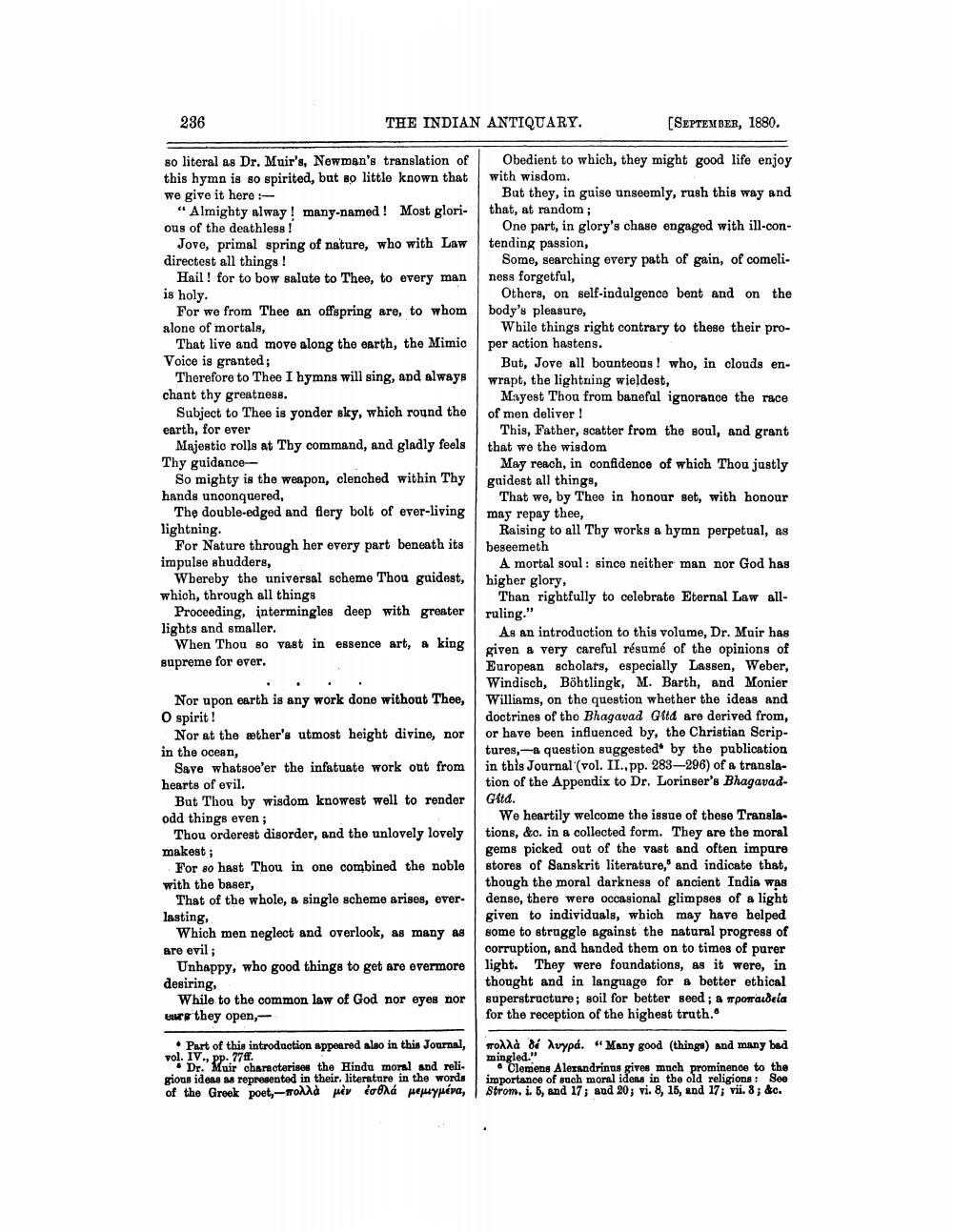________________
236
THE INDIAN ANTIQUARY.
(SEPTEMBER, 1880.
80 literal as Dr. Muir's, Newman's translation of Obedient to which, they might good life enjoy this hymn is so spirited, but a little known that with wisdom. we give it here:
Bat they, in guise unseemly, rush this way and "Almighty alway! many-named! Most glori- that, at random; ous of the deathless!
One part, in glory's chase engaged with ill-conJove, primal spring of nature, who with Law | tending passion, directest all things !
Some, searching every path of gain, of comeliHail! for to bow salute to Thee, to every man ness forgetful, is holy.
Others, on self-indulgence bent and on the For we from Thee an offspring are, to whom body's pleasure, alone of mortals,
While things right contrary to these their proThat live and move along the earth, the Mimic per action hastens. Voice is granted;
But, Jove all bounteous! who, in clouds enTherefore to Thee I hymns will sing, and always wrapt, the lightning wieldest, chant thy greatness.
Mayest Thou from banefal ignorance the race Subject to Thee is yonder sky, which round the of men deliver ! earth, for ever
This, Father, scatter from the soul, and grant Majestio rolls at Thy command, and gladly feels that we the wisdom Thy guidance
May reach, in confidence of which Thou justly So mighty is the weapon, clenched within Thy guidest all things, hands unconquered,
That we, by Thee in honour set, with honour The double-edged and flery bolt of ever-living may repay thee, lightning.
Raising to all Thy works a hymn perpetual, ag For Nature through her every part beneath its
beseemeth impulse shudders,
A mortal soul: since neither man nor God has Whereby the universal scheme Thou guidest, higher glory, which, through all things
Than rightfully to celebrate Eternal Law allProceeding, intermingles deep with greater ruling." lights and smaller.
As an introduction to this volume, Dr. Muir has When Thou so vast in essence art, a king
given a very careful résumé of the opinions of supreme for over.
European scholars, especially Lassen, Weber,
Windisch, Böhtlingk, M. Barth, and Monier Nor upon earth is any work done without Thee, Williams, on the question whether the ideas and O spirit !
doctrines of the Bhagavad Gita are derived from, Nor at the æther's utmost height divine, nor or have been influenced by, the Christian Scripin the ocean,
tures,-a question suggested by the publication Save whatsoe'er the infatuate work out from in this Journal (vol. II. pp. 283-296) of a translahearts of evil.
tion of the Appendix to Dr. Lorinser's BhagavadBut Thou by wisdom knowest well to render Gita. odd things even ;
We heartily welcome the issue of these TranslaThou orderest disorder, and the unlovely lovely tions, &c. in a collected form. They are the moral makest;
gems picked out of the vast and often impure For so hast Thou in one combined the noble stores of Sanskrit literature, and indicate that, with the baser,
though the moral darkness of ancient India was That of the whole, a single scheme arises, ever. dense, there were occasional glimpses of a light lasting,
given to individuals, which may have helped Which men neglect and overlook, as many as some to struggle against the natural progress of are evil;
corruption, and handed them on to times of purer Unhappy, who good things to get are evermore light. They were foundations, as it were, in desiring,
thought and in language for a better ethical While to the common law of God nor eyes nor superstructure; soil for better seed; a poradela eurs they open,
for the reception of the highest truth.
• Part of this introduction appeared also in this Journal, vol. IV., pp. 77.
Dr. Muir characteriseg the Hindu moral and religious ideas as represented in their literature in the words of the Greek poet,--Told per ég á reuypera,
mola di Avypá. “Many good things and many bad mingled."
Clemens Alexandrinus gives much prominence to the importance of snch moral idens in the old religions : See Strom. i. 5, and 17; and 20; vi. 8, 15, and 17; vii. 8; &c.




